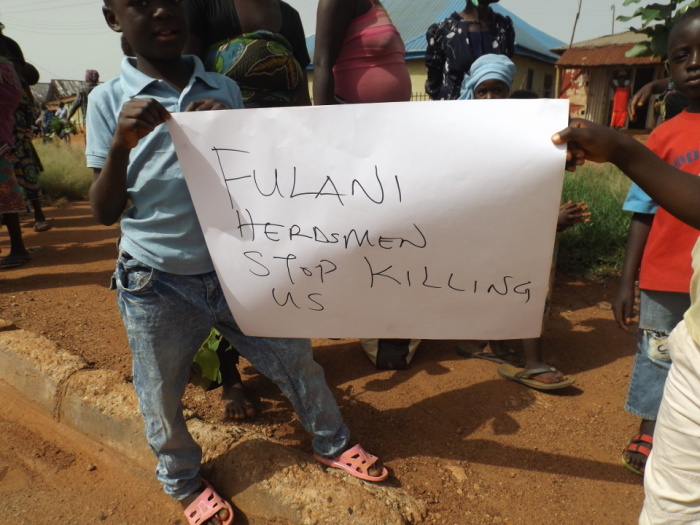6 killed, 3 wounded in Fulani attacks on Christian communities in Nigeria: NGO
Community in Plateau state attacked during church service

Radical Fulani militants reportedly killed six and wounded three others in attacks on two predominantly Christian farming communities in Nigeria's Plateau state this week as violence and death continue to increase in the African country, according to a report.
The deaths and injuries occurred between Oct. 1 and Oct. 5, the U.S.-based persecution watchdog International Christian Concern reported, adding that herders also destroyed more than 13 hectares of farmland worth millions of naira.
ICC said it had sponsored eight hectares of the farmland that was destroyed.
"I received a distressed call from the local zone chairman that, while they were in their place of worship that morning, it came to their notice that Fulani pushed their herds on the farm and grazed eight hectares of soybean [sic] crop," an ICC farm manager identified only by the name Paul was quoted as saying.
"I assessed what happened to be deliberate, because if it was not well planned it would have been impossible to destroy eight hectares of farmland within that short of a period."
ICC hasn't disclosed the name of the exact area in Plateau State where the violence took place.
ICC quoted the community leader of one of the attacked communities saying that "the attackers came during our church service."
"They grazed their cattle inside our farms, including the community farm," the community leader added. "Three of our vigilantes went to stop them without knowing that the attackers came with sophisticated weapons. Sadly, three of the vigilantes who guard the farm paid the price of becoming Christians and were killed that day."
About 11 miles from that village, Fulani militants also killed two Christian farmers on Oct. 1, ICC noted.
On Oct. 2, two more Christians were ambushed. One sustained gunshot wounds and is in critical condition.
The Global Terrorism Index ranks Nigeria as the third country most affected by terrorism in the world.
A new report by Anambra-based nongovernmental organization International Society for Civil Liberties and Rule of Law (Intersociety) estimates that 4,400 Christians have been killed in the first 270 days of 2021 in Nigeria. The report claims Fulani radicals were responsible for killing no less than 2,540 Christians in the first nine months of 2021.
The organization also states that at least 20 religious leaders have been killed or abducted during that time frame.
The organization, headed by Christian criminologist Emeka Umeagbalasi, called the ongoing violence "untamed anti-Christian genocidal killings and property violence."
Intersociety's estimates rely on what the organization deems to be credible local and foreign media reports, government accounts, reports from international rights groups and eyewitness accounts. Because of the lack of adequate government record keeping, death tolls reported by media outlets or government entities are estimates and can be skewed.
Global human rights activists continue to raise the alarm about the troubling trend of deadly attacks on communities in the farming-rich Middle Belt of Nigeria by radicalized Fulani herders and in the country's northeast by Islamic extremists.
"The Nigerian Government has continued to face sharp criticisms and strong accusations of culpability and complicity in the killings and supervision of same," a previous Intersociety report read.
"The country's security forces have so fumbled and compromised that they hardly intervene when the vulnerable Christians are in danger of threats or attacks, but only emerge after such attacks to arrest and frame up the same population threatened or attacked."
Advocates warn that insurgent groups often experience no accountability for their actions or receive ransoms for kidnappings, though the government denies paying ransom to terrorists.
Nigeria is Africa's most populous country and is ranked No. 9 on Open Door's 2021 World Watch List of countries where Christians face the most severe persecution.
Last December, Nigeria became the first secular democracy to be added to the U.S. State Department's list of countries of particular concern for engaging in or tolerating "systematic, ongoing, egregious violations of religious freedom."
The government has maintained that the violence in the Middle Belt is the result of decades-old clashes between farmers and herders. Activists contend that the government is overlooking the religious factors at play in the violence.
The Nigerian government pushed back on claims that there is a "genocide" against Christians occurring in the country. Last June, the Nigerian presidency accused separatists of launching an international smear campaign through nongovernmental organizations and media outlets.
U.S.-based advocacy groups refuted the government's claim. The Jubilee Campaign USA argued that the government is trying to distract "from their own incompetence or collusion with the perpetrators of genocide on the Christian communities in the North and Middlebelt parts of Nigeria."
Spanning across more than a dozen countries in the Sahel and West Africa, the Fulani people are the largest nomadic ethnic group in the world and are predominantly Muslim.
The U.S. Commission on International Religious Freedom reported last year that in recent years, Fulani communities have faced “recurrent cycles of resource conflict and intercommunal violence.” That violence has "escalated religious tensions in a region home to many Muslim and Christian communities that have peacefully lived side-by-side for centuries."




























